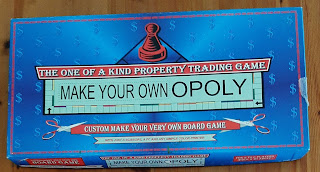Make Your Own Opoly
Following up on the last article, the same day I found the 1972 British edition of Monopoly, I also grabbed what seemed like and oddity, called Make Your Own Opoly. I never cared for all of those themed, skinned editions of Monopoly. It was a bit amusing early on, but now every state and town has an edition of their own, every major TV show, movie editions, Star Wars, Simpsons, Las Vegas, Harry Potter ... argh. Sometimes it's nice to see a store have a section labeled "Games" only to have it be just 20 or 30 funky clones of Monopoly, as if there was nothing else available in the world.
So this one just struck me as odd.
Early on in my programming career, about the first project I would do to learn a new language would be a few bits of D&D (of course) and then a simple board game, almost always Monopoly, because it was so universal and had a good variety of features (board, cards, money, properties) to write code for. Back in the shareware days, I had a clone of my own called Space Tycoon, and even had extra downloads of data files defining new board layouts, decks of Space cards and such.So, what did I expect from Make Your Own Opoly? Not this:
It's a blank board and a CD-ROM for Windows 98. From the instructions booklet, the CD has templates to print-and-play board squares, cards decks, even custom cash designs if you wanted to.But I don't want to. It also came with dice and some cheap tokens. This would have been a fun experiment back in the days before there were hundreds of apps of Monopoly clones available at a few clicks. But now, I would rather click around a bit and experiment with existing apps. I don't even have a machine with a CD drive. But it was a bit ahead of its time in the print-and-play realm. It's just somewhat bizarre that you have to buy the big old box just for the game board.
Looking back, I probably should have grabbed the shrink-wrapped James Bond edition Monopoly instead, but hey, live and let die.





Comments
Post a Comment